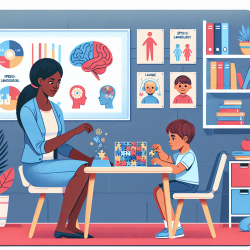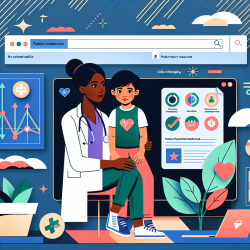As a speech-language pathologist dedicated to creating positive outcomes for children, it is crucial to stay informed about the latest research and methodologies that can enhance our practice. One such recent study, "Athens multifamily therapy after a first psychotic episode: Online therapy during the COVID-19 pandemic," offers valuable insights into the effectiveness of online multifamily therapy (MFT) for young individuals who have experienced a first psychotic episode (FEP). This blog will explore how practitioners can implement these findings to improve their therapeutic approaches.
Overview of the Study
The Athens Multifamily Therapy Project (A-MFTP) aimed to provide systemic multifamily group therapy to youths who experienced a first psychotic episode and their families. Since 2017, the project has run five groups, each consisting of four to five families, with sessions occurring bi-weekly over ten months. The participants were recruited from the longitudinal Athens FEP Project, which investigates genetic and environmental determinants of psychosis risk.
During the COVID-19 pandemic, therapy sessions transitioned to an online format. Participants were asked to answer qualitative questions regarding the perceived effectiveness of the therapy at three time points: mid-therapy, end of therapy, and a six-month follow-up.
Key Findings
- Reciprocity in Communication: Group members emphasized the importance of reciprocity in communication. They noted that sharing and exchanging experiences helped them feel heard and understood.
- Emotional Transition: Participants moved from feelings of fear and embarrassment when discussing their diagnosis to feelings of safety and comfort.
- Perceived Effectiveness: Qualitative analysis revealed no significant difference in participants' perception of the effectiveness of multifamily therapy between live and online modalities.
Implications for Practitioners
Based on these findings, practitioners can implement several strategies to enhance their online therapy services:
- Foster Reciprocity: Create an environment that encourages open communication and mutual support. This can be achieved through structured activities that promote sharing and listening.
- Emotional Safety: Develop strategies to help clients transition from initial feelings of fear and embarrassment to comfort and safety. This might include validating their experiences and normalizing their feelings.
- Utilize Online Platforms Effectively: Given the comparable effectiveness of online and live therapy, practitioners should become proficient in using online platforms. This includes mastering technical aspects and developing engaging online activities.
Encouraging Further Research
While the study provides promising results, further research is needed to generalize these findings across different populations and settings. Practitioners are encouraged to contribute to this body of knowledge by conducting their own research and sharing their findings with the community.
To read the original research paper, please follow this link: Athens multifamily therapy after a first psychotic episode: Online therapy during the COVID-19 pandemic.










